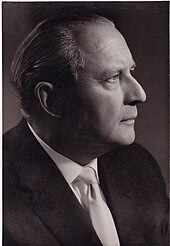Franz Pfeiffer (lawyer)
Franz Pfeiffer (born October 14, 1900 in Neustadt an der Weinstrasse ; † June 21, 1979 there ) was a German administrative lawyer and district president of the Palatinate . He was a member of the German Center Party until it was banned under National Socialism .
education
Pfeiffer was born on October 14, 1900 as the eldest son of the director of studies Jakob Pfeiffer in Neustadt an der Weinstrasse, which at that time was still called Neustadt an der Haardt . After finishing school, he passed the Abitur at the Humanist Gymnasium in Neustadt (today Kurfürst-Ruprecht-Gymnasium ) with very good grades. In 1917 he was drafted and completed basic training as an officer candidate with the 12th Bavarian Field Artillery Regiment in Landau . As a soldier he was no longer used in the First World War .
Pfeiffer studied in Munich at the Ludwig-Maximilians-University of Law . During his studies he was active in two student associations of the Catholic student association CV. He led the KDStV Aenania association as a senior and was a co-founder of the KDStV Trifels association in Munich. At the beginning of the 1920s he completed his law studies with the state examination and grade 1, then he was awarded a Dr. jur. PhD . During his student days in Munich he experienced the November putsch by Adolf Hitler and the appearance of the Nazis.
job
After completing his doctorate, Pfeiffer entered the Bavarian administrative service. He was first from 1928 to 1931 a government assessor in the district government of the Palatinate in Speyer and then from 1931 to 1933 government councilor and deputy district administrator at the district office of the Palatinate in Neustadt an der Weinstrasse. During this time he had NSDAP and Hitler’s election events banned and / or dissolved by the police several times.
After Hitler came to power , Pfeiffer was arrested by the Gestapo on June 24, 1933 and accused of sedition and high treason. Together with three other "celebrities" he was shown through the city. The arrested had to carry a sign with the inscription “There are no more villains like us here!” And endure the abuse of the bystanders. Pfeiffer was then taken into so-called protective custody. After three days, through the mediation of the Bishop of Speyer , Ludwig Sebastian , Pfeiffer was released; he was released on condition that he leave the Palatinate immediately. In Munich he was accepted by friends and worked as a clerk at the Bavarian Insurance Chamber.
After the end of the Second World War , Pfeiffer was interned by the Americans in the Heilbronn POW camp in 1945, but released a short time later. In 1947 he returned to his home in the Palatinate and on March 10, 1948, he was appointed as deputy head of the Palatinate administration. From the beginning of July 1951 until his retirement on February 28, 1966, he was government president of the Palatinate . During his term of office the reconstruction of the Palatinate falls after the complete destruction and dissolution of the structures after the end of the Nazi dictatorship and the collapse of the Third Reich.
Non-professional activities and honorary positions
Pfeiffer was a co-founder and president of the Rotary Club in Kaiserslautern. Later he also initiated the foundation of the Rotary Club Landau-Neustadt. Among other things, he worked on a voluntary basis on the advisory board of the Bayerische Hypotheken- und Wechselbank , chairman of the supervisory board of the Pfälzische Pensionsanstalt, on the board of the Pfalzwerke and as chairman of the Palatinate Red Cross .
Honors
- Great Cross of Merit of the Federal Republic of Germany (1966)
- Decoration of Honor of the German Red Cross (1966)
- New Year's Order
literature
- Franz Pfeiffer , in: Internationales Biographisches Archiv 38/1979 of September 10, 1979, in the Munzinger Archive , accessed on October 31, 2016 ( beginning of the article freely accessible).
Individual evidence
- ↑ Gerhard Wunder: The Nazi dictatorship 1933–1945 in the context of Neustadt. (PDF; 178 kB) p. 7 , accessed on October 31, 2016 .
- ↑ Peter Stitz: The CV 1919–1938: the university-political path of the Cartell Association of Catholic German Student Associations (CV) from the end of the First World War to the destruction by National Socialism . Society for CV History, Munich 1970.
- ↑ a b Hans-Michael Körner , Bruno Jahn: Large Bavarian biographical encyclopedia . Volume P-Z . Saur, Munich 2005.
- ↑ The Palatinate belonged to Bavaria since 1816.
- ↑ Palatinate Citizens Newspaper . Neustadt, March 11, 1933.
- ^ City and Village Gazette . Neustadt, March 11, 1933.
-
↑ Apart from Pfeiffer, those arrested were:
- Michael Bayersdörfer (1867–1940), member of the Reichstag for the BVP
- Josef Matt, Chairman of the Neustadt Center Party and Director of the Neustadt Local Health Insurance Fund
- Gustav Weil (1871–1941), the last party and parliamentary group leader of the Neustadt SPD before the Nazi era (since 1928 and 1930)
- ^ District Court and Prison. Memorial for Nazi Victims in Neustadt, accessed on October 31, 2016 .
- ^ City and Village Gazette . Neustadt, June 27, 1933.
- ^ Werner Schineller : The regional presidents of the Palatinate . A brief history of the administration of the Palatinate. In: Voice of the Palatinate . 52, part 1, pp. 16-18; Part 2, pp. 13-15, 2001.
| personal data | |
|---|---|
| SURNAME | Pfeiffer, Franz |
| BRIEF DESCRIPTION | German administrative lawyer and district president of the Palatinate |
| DATE OF BIRTH | October 14, 1900 |
| PLACE OF BIRTH | Neustadt an der Weinstrasse |
| DATE OF DEATH | June 21, 1979 |
| Place of death | Neustadt an der Weinstrasse |
